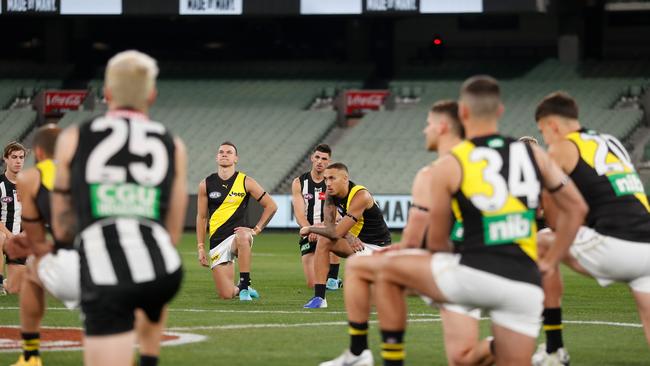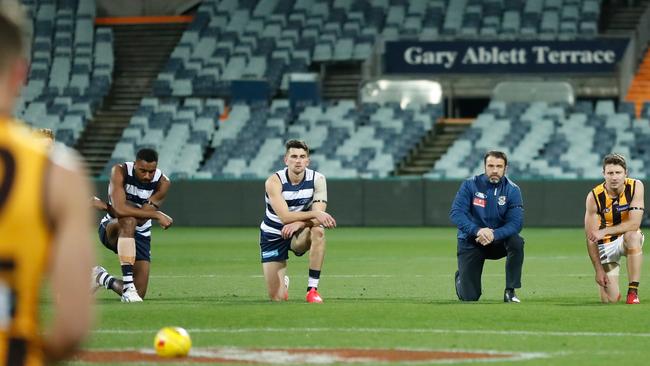Susie O’Brien: Why AFL players’ decision to kneel was the right thing to do
Footy players taking a knee before the weekend’s matches was a small gesture that means a lot, and it should be applauded, writes Susie O’Brien.

Susie O'Brien
Don't miss out on the headlines from Susie O'Brien. Followed categories will be added to My News.
I felt proud watching AFL players kneel in support of racism on the weekend. It’s only a symbol, but it’s a poignant one that mirrors anti-racist actions in the US and elsewhere.
Most famously, it is associated with US football player Colin Kaepernick. He’s a former San Francisco 49ers quarterback who went down on one knee during the national anthem in 2016 to protest against police brutality towards black Americans. His actions were so controversial they ended his career.
It has now become a widely recognised symbol of the Black Lives Matter movement, where it’s known as “taking a knee”.
The fact that indigenous Carlton player Eddie Betts received a text of a chimp over the weekend shows racism continues to be an ugly and enduring part of the game. I admire Betts for publishing the post and holding its sender to account. As he says, being silent hasn’t worked.
“If at any time anyone is wondering why we work so hard
to bring attention to the importance of stamping out racism, this is it,”
he said.
The AFL kneel initiative came from a couple of indigenous players, and spread to clubs before being adopted by the players and umpires.
It’s important that it came from the players; to have something like that imposed top-down by the league would be meaningless
But it has to be backed up with decisive action. The AFL does not deserve to get accolades for this step if it does nothing when players are taunted on social media or booed at games. Continued racist taunting and trolling of indigenous players and past players shows more needs to be done to address racism in the league.
The AFL did not act against the booing of former Sydney Swans player Adam Goodes. The league had inclusion and diversity policies aplenty, but this wasn’t enough to stop one of the greats from being hounded from the game by small-minded individuals.
The AFL has since apologised to Goodes for not doing more to stop a campaign of abuse against him. So what is it doing to help protect Betts and others like him who continue to cop it right now?

Talk is cheap: it’s easy for AFL head Gillon McLachlan to say that “racism needs to be stamped out”. But it’s harder when one of those employing racist epithets is someone like broadcaster Eddie McGuire, who used a derogatory term against Goodes on radio in 2013.
The AFL also seems unable to properly address the claims made by Heritier Lumumba. The former Collingwood star says the league has been negligent in addressing the racism he suffered during his playing years. This included being called “Chimp” by teammates and enduring a “culture of racist jokes”.
Like Goodes, Lumumba is seen as a troublemaker whose testimony goes against the wider club’s interests. But why should Betts, Goodes or Lumumba stay quiet when they’re treated in this way? The ape reference is particularly hurtful because it suggests that indigenous players are subhuman because of the colour of their skin.
There are few people who don’t support the Black Lives Matter campaign and its local version pushing for more to be done to address homegrown racism against Aboriginal people. This includes addressing incarceration rates, the gap in life expectancy, the lack of health care and the deplorable living conditions of many indigenous people on their tribal lands.
And yet the reaction to the AFL kneel was disappointing.
American athletes have a long and proud history of using sport to take a stand against racism, but some people in this country think sport should be apolitical.
Ask Betts, Goodes or Lumumba – football is never free of politics.
Some disgruntled fans took to social media to condemn the AFL for the move. Former Footy Show panellist Sam Newman was one, tweeting his disgust about the “mob mentality” and hinting at some darker motive by McLachlan. “AFL is sport!” he wrote.
He didn’t expand on his theory — probably because there isn’t one.
Some St Kilda and Fremantle fans were so disgusted they asked for refunds. The clubs were happy to oblige. Who wants fans like that?
Talks are under way about ongoing initiatives, including the option of making the kneel a regular feature. It’s a great idea, as long as the AFL backs it up with action.
Betts and others who continue to be harassed and taunted both in person and online need to know they are not alone. As Betts said over the weekend: “To ignore it is to be part of the problem, to call it out is to be part of the solution.”
The kneel is a small but important step towards stamping out racism in the game we love.
Susie O’Brien is a Herald Sun columnist

